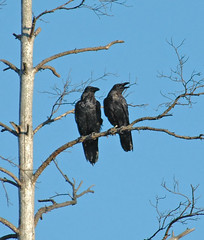 While driving to work this week, a raven flew low over my car, carrying with it a sign of spring. The raven was holding a stick in its beak, which gave me hope that spring really is coming, despite the two feet of snow that fell just a couple of days prior. Although I quickly lost sight of the bird, I’m sure it was heading to a nest under construction somewhere nearby.
While driving to work this week, a raven flew low over my car, carrying with it a sign of spring. The raven was holding a stick in its beak, which gave me hope that spring really is coming, despite the two feet of snow that fell just a couple of days prior. Although I quickly lost sight of the bird, I’m sure it was heading to a nest under construction somewhere nearby.
Common Ravens are one of our earliest nesting bird species in Vermont. They often begin construction of their nests in March, usually on cliff faces, but also in evergreen trees. Sometimes ravens will share a cliff with the much rarer Peregrine Falcon. Ravens lay between 3 and 7 eggs, with 2 to 4 nestlings usually surviving to fledgling. In Vermont, young ravens may be out of the nest as early as May, before many migrant songbirds have even arrived on their breeding grounds.
A few other bird species nest early in the season, including Great Horned and Barred Owls, American Crowd and Pine Siskins . The Gray Jay, a species in the same family as the Common Raven and found only in the Northeast Kingdom of Vermont, has been observed nest building as early as March in Vermont.
So, while spring doesn’t officially begin until March 20 (and it usually snows well into April), there are plenty of signs of spring to be alert to. What are you seeing? We hope you’ll share with us your own hopeful observations.

No comments:
Post a Comment